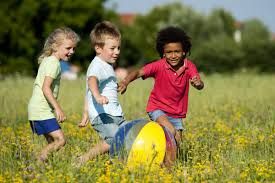Polyamory
Fear of Damage to Children in Polyamorous Families
Answering a worried mother's question
Posted October 2, 2015
In my capacity as an expert on polyamory, I sometimes get quesitons from concerned parents, grandparents, and other well-meaning adults who are worried that polyamorous families might be harmful to children. In this blog series I have already addressed some issues relevant to children in poly families such as the status of children in polyamorous families, when partners leave polyamorous families with children, and how kids deal with their parents' families of origin or other sources of stigma in their lives. Below, I include a concerned parent's question and my response to it.
Myself and my boyfriend recently have taken on a girlfriend, so we have formed a triad. My question is how do I explain to my young children that this is not a normal lifestyle choice and that it is not expected out of them when they grow older? My mother has expressed concern to me about this because she thinks that me having not only a boyfriend or a girlfriend but having both could be damaging to my children's mental health. I do not desire to harm my children in any way so I am asking for advice on this subject.
The short answer is: Yes, polyamorous families can be healthy. Just like other families, the way having poly parents affects children depends in large part on how the adults conduct themselves in their relationships. There is nothing inherently pathological about polyamorous families, and they are not destined to damage the children who grow up in them. Polyamorous families can create healthy, stable, loving environments for children when the adults provide that kind of environment. Poly families are not perfect, and their kids experience some of the same problems common in other blended families. For those poly folks who can find the right balance in their relationships, however, multiple-adult families can be extremely advantageous for children and adults.

The medium answer includes: Multiple adults provide lots of attention, greater life experience, copious support, and abundant role models for children. Pooling their resources also allows adults to have more personal time, work more flexible hours, and get more sleep because there are multiple people around to take care of the children. Poly parents said that they felt more patient and had more energy for their children when they were well rested and had sufficient income – all of which benefitted their children.
The long answer is also that: It depends a lot on how the adults talk to the kids and how old the kids are. How poly parents talk to their kids about it makes a big difference to how the kids will think or feel about the parents’ poly relationships. For kids of all ages, the best strategy seems to be an age-appropriate and honest response to kids’ questions. Divorce is so common today that almost all children know peers with multiple parents already – dad and his new wife, mom and her new girlfriend – so the presence of additional adults is not nearly as socially outlandish as it would have been 50 years ago. It also makes it very easy for kids from poly families to blend in with kids from divorced families, so the poly family kids hardly ever have to explain their families to teachers, coaches, or casual acquaintances.

How old the children are also makes a big difference in what they think of the adults in their environments. Small kids eight or under generally do not have a sophisticated understanding of adult romantic relationships, and so might not need an explanation at all. Little kids take their family form for granted because it is all they know, and until they learn that other peoples’ families are different they will not think that their family is unusual. Parents’ partners are likely to blend in with all of the other caring adults in kids’ lives, and there is no need for parents to make a big deal out of what happens after the kids are in bed. If the adults are upset about the poly relationship, then the kids will notice the adults’ discomfort but might not understand that it is related to the new adult in their social world. When adults are comfortable with their romantic relationships, young kids generally do not problematize them either.
Tweens from nine to 12 have a more sophisticated understanding of adults’ relationships and might notice looks or touches between adults the way their younger siblings do not. When kids notice something happening and appear uncomfortable about it, they might be concerned that the parents are cheating and the kid knows a terrible secret that will hurt the other parent. In those cases, it is important for parents to let kids know that the parents are being honest with each other, it is not a secret from the other parent, and the kids can ask whatever questions they have. Kids in these settings often do not want detailed explanation of the romantic side, and using phrases like “hanging out” or “spending special time together” can be honest answers appropriate to smaller children.
As kids grow up, their understandings of adult interactions become more sophisticated and they have more points of reference to compare their families to their peers’ families. Generally they will become aware that their family is unconventional by the time they are late in elementary school, at which point they might begin wondering more about the adults in their lives. Creating a family atmosphere where children feel confident their questions will be met with thoughtful, honest answers allows kids to take the lead and ask questions not only about their family dynamics, but everything else too. Poly parents report that free ability to think and talk helps the children trust them and creates emotional intimacy for the whole family.

Finally, just because you are polyamorous does not mean your children will be polyamorous when they grow up. Kids in my study had a range of attitudes towards polyamory: some would under no circumstances consider doing it themselves, and others could see no other way to live a free and authentic life. Most of them, however, were not sure, and were still trying to figure out how to kiss or who they liked. They were going to leave any decision about polyamory to the future when they were older and it was more germane to their lives. Not one single child in my study said that they would be polyamorous because their parents were, and instead all of them thought about their own boundaries and considered their options.
For more information on children’s experiences in polyamorous families, please see my first book, The Polyamorists Next Door: Inside Multiple-Partner Relationships and Families (2014). It summarizes my 15-year study of polyamorous families with children, and it was just reprinted in paperback. My second book, Stories from the Polycule: Real Life in Polyamorous Families (2015), is a collection of stories written by people living in polyamorous families and gives a look at what daily life is like for poly folks.




